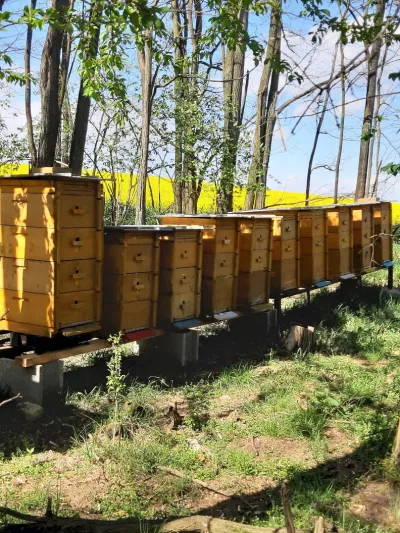General information
RDP Priority
- P2. Competitiveness
RDP Focus Area
- 2B: Entry of skilled/younger farmers
RDP Measure
- M06: Farm & business development
Beneficiary type
- Young farmer
Summary
A young farmer from Lučenec, a town in south-central Slovakia, applied for CAP support to establish his own bee farm. This enabled him to acquire 170 bee colonies, and to purchase the material and technical facilities that were needed for his business, including a honey extractor, honey and wax processing equipment, beehives, frames, etc.
Results
- The bee farm is now breeding queen bees and produces various bee products including honey, beeswax, propolis, pollen and royal jelly.
- The bee farm provides a steady source of income for the young farmer, which has enabled him to hire another worker on the farm.

Promoter
Juraj Vargic
Funding
RDP support: 50 000 (EUR)
EAFRD: 37 500 (EUR)
National/Regional: 12 500 (EUR)
Ressources
Documents
Context
Juraj Vargic is a young farmer from Lučenec, a town in south-central Slovakia. Motivated by his deep affection for bees and a strong desire to contribute to a better and healthier environment, he decided to establish beehives in his local community. After graduating from secondary vocational school, where he studied apiculture, he applied for CAP support to establish his own beekeeping farm.
Objectives
The aim of this agri-food investment project was to help a young farmer start up a large-scale commercial bee-keeping business in Slovakia by co-financing 170 new bee colonies.
Activities
Project activities included:
- acquiring 170 bee colonies.
- constructing an apiary and purchasing material and technical facilities including a honey extractor, honey and wax processing equipment, beehives, and comb frames.
Juraj uses five sites for the bees to harvest nectar, this allows him to keep the colonies in good health but also to safeguard a variety of honey.
Main results
- The young farmer realised their goal thanks to 50 000 euros of RDP funds for breeding queen bees and undertaking the secondary processing of various bee products including honey, beeswax, propolis, pollen and royal jelly.
- The bee farm provides a steady source of income, contributing to the young farmer's financial stability.
- The establishment of the bee farm created an additional job for another bee farm worker, promoting local employment.
- By participating in accredited courses, the young farmer gained valuable knowledge and skills related to project implementation.
- Visitors to the farm can learn about beekeeping, pollination, and the importance of bees in the ecosystem. This promotes environmental awareness and education.
Key lessons
- Beekeeping requires passion and intuition.
- Setting up a new business venture in the primary sector as a young farmer may require time and dedication. Young people may be considered a higher risk, and technical support can help strengthen business confidence in the durability of youth business ideas.
- CAP support can be a vital development tool for subsidising risks, to help co-finance basic infrastructure and put young rural entrepreneurs' ideas into action.
